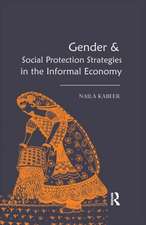Reversed Realities: Gender Hierarchies in Development Thought
Autor Naila Kabeeren Limba Engleză Paperback – 30 iun 1994
Naila Kabeer traces the emergence of “women” as a specific category in development thought and examines alternative frameworks for analyzing gender hierarchies. She identifies the household as a primary site for the construction of power relations and compares the extent to which gender inequalities are revealed in different approaches to the concept of the family unit. The book assesses the inadequacies of the poverty line as a measuring tool and provides a critical overview of an issue that has been fiercely contested by feminists: population control. While feminists themselves have no unanimous view of the meaning of “reproductive choice,” Kabeer argues that it is imperative for them to take a lead in the construction of population policy.
Preț: 214.57 lei
Nou
Puncte Express: 322
Preț estimativ în valută:
41.06€ • 42.87$ • 33.98£
41.06€ • 42.87$ • 33.98£
Carte disponibilă
Livrare economică 15-29 martie
Preluare comenzi: 021 569.72.76
Specificații
ISBN-13: 9780860915843
ISBN-10: 0860915840
Pagini: 346
Dimensiuni: 145 x 238 x 24 mm
Greutate: 0.54 kg
Ediția:New.
Editura: VERSO
ISBN-10: 0860915840
Pagini: 346
Dimensiuni: 145 x 238 x 24 mm
Greutate: 0.54 kg
Ediția:New.
Editura: VERSO
Notă biografică
Naila Kabeer is a Fellow at the Institute of Development Studies, University of Sussex. She has worked extensively on issues related to gender and development in Bangladesh, India and Vietnam.
Recenzii
“This vigorous assessment of development theory and policy concludes with a comparison of different approaches to gender training and a plea for the transformation of the institutions which determine development policy. A splendid synthesis of the new feminist development economics that challenges gender bias in both theory and practice.”—Nancy Folbre, University of Massachusetts
“This book is an invaluable resource. It deconstructs the official discourses of social planners and development economists, creating space for a critical and practical engagement with existing power structures, with a view to enabling women to be agents of their own development.”—Diane Elson, University of Manchester
“This book is an invaluable resource. It deconstructs the official discourses of social planners and development economists, creating space for a critical and practical engagement with existing power structures, with a view to enabling women to be agents of their own development.”—Diane Elson, University of Manchester





















